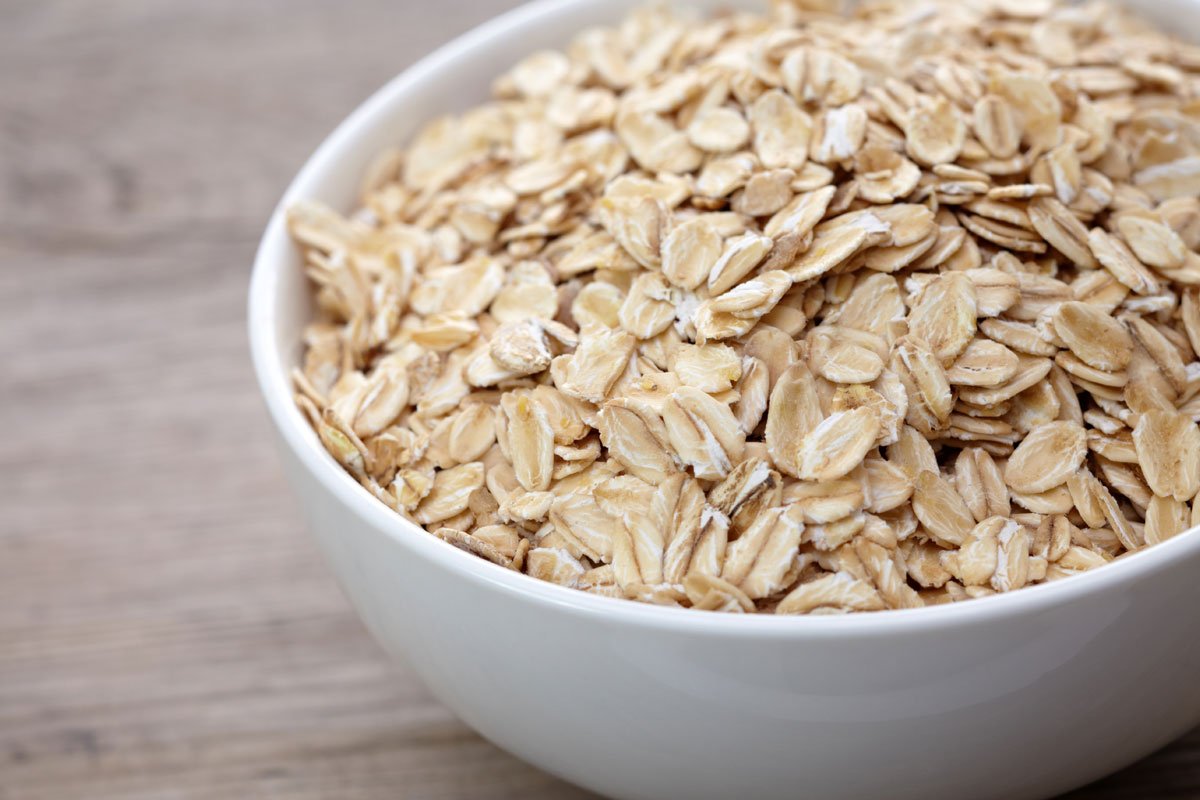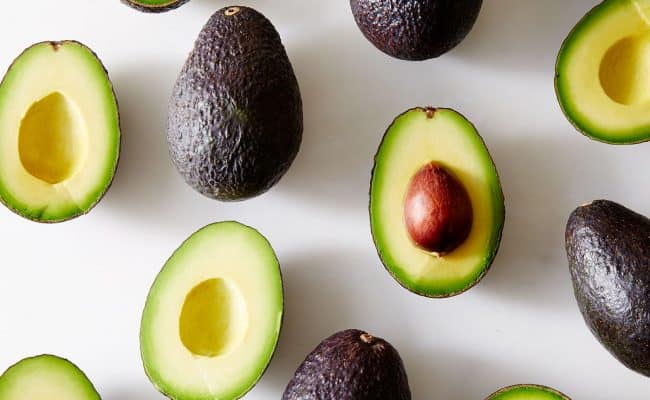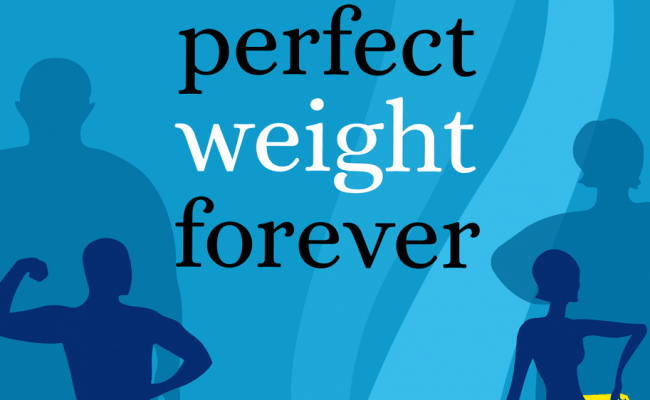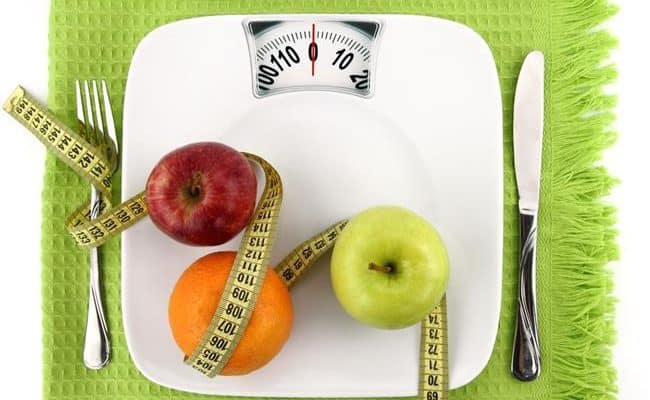
Oats come from the cereal plant Avena Sativa. They are milled and processed in a way that keeps them as a whole grain. Oats can come in the following forms: rolled, quick (instant), flakes, steel cut and can be ground down into flour.
Oatmeal can be a catch all term for any form of oats excluding the flour.
As a whole grain, oatmeal is high in fiber and is a source of protein, iron, magnesium and B vitamins.
There are even some approved health claims with consuming oats.
A compound called beta glucan in oats has been shown to lower blood cholesterol and may help regulate blood sugar levels, so health claims stating oats can help lower blood cholesterol and assist with blood sugar regulation may appear on some labels (1).
Consuming oatmeal as part of a healthy, balanced diet is recommended.
However, the oatmeal diet takes it to an extreme and suggests eating oatmeal for all or most of your meals.
Weight loss may be possible while following the oatmeal diet, but it is not a balanced approach to weight loss and may only produce temporary results.
Consuming oats in a more moderate amount may be the best way to still gain the health benefits of oats but still eat a balanced, varied diet.
In this Guide:
What is the oatmeal diet?
The oatmeal diet does not have a strict guideline, but in general it involves consuming A LOT of oatmeal with little or no variation.
Most websites suggest the first week of following the oatmeal diet entails eating oatmeal for all meals.
Some websites (2) suggest oatmeal for meal times should only be half a cup of oatmeal. A half cup of cooked oatmeal is considered a serving or ounce equivalent for the grain group.
The USDA recommends women should get 5-6 servings of grains per day and men should get between 6-8 servings of grains per day.
If you are eating a half cup of cooked oatmeal made with either water or skim milk, this will provide around 150-300 calories depending if you use half cup of dry or half cup of cooked oatmeal.
It is not explicitly clear if you should consume a half cup dry (which prepares about a cup cooked oatmeal) or a half cup total cooked oatmeal at meal times. Regardless, your calorie intake will be low.
For your first week following the oatmeal diet, you should use rolled oats.
The second week on the oatmeal diet allows you to add various fruits and veggies to your diet. Oatmeal for meal times drops down to two meals a day instead of three.
A low fat meal is recommended for your other meal of the day. Other types of oats are also allowed during the second week.
Bottom Line
he oatmeal diet consists of eating a ½ cup of oatmeal for 2-3 meals a day.
Does the oatmeal diet work for weight loss?
Following the oatmeal diet can be considered a low-calorie diet that would lead to weight loss.
In fact, the first week of following the diet is considered a very low-calorie diet as your intake will probably be less than or close to 1,000 calories per day.
The oatmeal diet can be considered a fad diet because it is extremely restrictive in food options and is not sustainable long term.
Oats are a nutrient dense food providing fiber, protein, vitamins and minerals. However, no single food provides a complete amount of all vitamins and minerals you need.
Therefore, following a diet that recommends eating only one or two foods for your total intake is not a balanced approach to weight loss and is only a short term alternative.
Bottom Line
The oatmeal diet can work for weight loss because it is considered a low calorie diet.
Can I lose weight by eating oatmeal?
Oatmeal has many properties that can be helpful for weight loss. Following a low calorie diet can leave you feeling hungry and unsatisfied which is one reason they may not always work long term for weight loss.
However, foods high in fiber, like oatmeal, can leave you feeling satisfied after eating.
Oatmeal also provides protein which is another satiating nutrient. Combining fiber and protein at meal times can help boost your satisfaction after eating and hinder your appetite after eating.
Therefore, because oatmeal has some nutrients that help make you feel full, oatmeal can be helpful for weight loss.
However, it doesn’t have to be the only food you eat like in the oatmeal diet.
There are plenty of other foods that can be part of a healthy weight loss plan, and incorporating a variety of foods will add sources of other nutrients in your diet.
Bottom Line
Oatmeal is high in fiber and protein, and both nutrients can help leaving you feel satisfied after eating which can be helpful for weight loss.
Is the oatmeal diet healthy?
Just because you can lose weight on a diet doesn’t mean it is necessarily healthy. You can lose weight on many fad diets, but they are not considered healthy.
The oatmeal diet can help with weight loss because it is low in calories. Oatmeal is considered a healthy, nutrient dense food.
However, when you exclusively only eat one food for weight loss, this is not a sustainable or healthy practice long term.
Oatmeal can offer many health benefits, but so can many other foods. Eating only oatmeal for a few weeks is boring and monotonous.
After you stop the oatmeal diet (or any other diet), if you start eating high calorie foods in excess, you can re-gain the weight you lost in no time.
A better more sustainable approach to weight loss is to eat a variety of healthy, weight loss supporting foods instead of only 1-2 foods.
Other foods besides oatmeal that can make up a healthy weight loss diet include: fruits, vegetables, other whole grains, legumes, lean proteins and heart healthy fats.
Bottom line
The oatmeal diet is very restrictive in food choices. Eating a diet with a broader variety of healthy foods can be a more sustainable approach to weight loss.
Oatmeal nutrition
What makes oatmeal a nutritious food choice? A half cup of dry oatmeal (which makes about 1 cup cooked) provides the following:
- 150 calories
- 3 grams of fat (4% DV)
- 150 mg potassium (4% DV)
- 27 grams carbohydrate (9% DV)
- 4 grams fiber (15% DV)
- 5 grams protein (12% DV)
- 2% DV calcium
- 8% DV iron
- 10% DV Thiamin (vitamin B1)
- 15% DV phosphorus
- 10% DV magnesium
If you make oatmeal with milk, the amount of calories, fat, carbohydrate, protein, potassium, calcium, vitamin D, vitamin B1, phosphorus and magnesium will be higher.
Bottom line
A half cup dry oats provides about 150 calories and a source of many nutrients including: fiber, protein, iron, magnesium and vitamin B1.
Oatmeal health benefits
Research studies have shown oats can provide many health benefits related to heart health, blood sugar regulation, possible cancer protection and being a source of antioxidants.
In general, the form of oats doesn’t matter; any type of oat can provide health benefits.
Oats and heart health
Many of oatmeal’s health benefits can be attributed to its soluble fiber. Soluble fiber can help lower blood cholesterol and help regulate blood sugar levels.
In a 2001 study (4), researchers put study participants on either a control hypo-caloric diet or a hypo-caloric diet containing oats.
Both groups had equal amount of calories, and participants were on these diets for 6 weeks.
After 6 weeks, both groups lost weight with no significant difference between groups.
However, the oat group had significantly lower blood pressure, LDL cholesterol and total cholesterol compared to the control group.
A 2010 study (5) concluded eating an oat based ready to eat cereal as part of a weight loss diet significantly reduced LDL cholesterol in study participants compared to the control group.
Based on many studies suggesting the fiber in oats can benefit heart health, the FDA allows food products low in saturated fat, cholesterol and high in soluble fiber to claim they can reduce cholesterol as part of a heart healthy diet (6).
How much soluble fiber do you need for heart health benefit? Three grams of soluble fiber per day is suggested, and a food product with this health claim should say how many grams of soluble fiber it provides.
The health claim (7) allowed by the European Union (EU) suggests 3 grams of oat beta-glucan (the specific type of soluble fiber from oats) per day may help lower blood cholesterol levels.
A 60-gram serving of oats provides about 3 grams of beta-glucan.
Bottom line
Oats are a source of soluble fiber which has been shown to help lower blood cholesterol levels. Some studies have also shown oats may help lower blood pressure.
Antioxidants in oats
The soluble fiber in oats is often highlighted as the main nutrient super star in oats.
However, a 2017 review (8) suggests the antioxidants in oats should not be over looked.
The phytochemicals in oats can provide anti-inflammatory and antioxidant health benefits. The specific phytochemicals from oats include: avenanthramides, and avenacosides A and B.
Research with the specific benefits of these phytochemicals from oats is still new. Additional health benefits from these antioxidants may be found in the future.
Bottom line
Besides soluble fiber, oats also provide antioxidants.
Oats and cancer risk
The avenanthramides from oats have been shown to be cancer fighting in in vitro and in vivo studies (9).
Therefore, eating oats may offer some protection to body cells against cancer. However, more research is needed.
Besides providing a source of antioxidants, oats may offer protection against cancer another way.
Oats are considered a whole grain, and eating whole grains daily is associated with reducing risk of colon cancer (10).
Oats provide two types of fiber: soluble and insoluble. The soluble fiber can go into the blood stream to help lower blood cholesterol and regulate blood sugar.
The insoluble fiber stays in the digestive tract and can help move the passage of food through the colon.
Bottom line
Oats and other whole grains may help lower risk for colon cancer.
Oats and blood sugar
The soluble fiber from oats can slow the release of glucose into the blood stream. Studies have shown oats can help lower blood glucose levels and can help reduce the risk of type 2 diabetes (11).
A 2015 review (12) analyzed the results of sixteen studies to see if oats are beneficial for diabetic patients.
The results of these studies show oat intake can significantly reduce level of glycosylated hemoglobin A1c, fasting blood glucose, total and LDL blood cholesterol levels.
Oatmeal has also been shown to significantly lower the postprandial blood glucose and insulin response after a meal.
In type 2 diabetic patients, oat intake is considered beneficial for glucose control and benefiting heart health.
However, more research is needed for safety of oat consumption in those with type 1 diabetes.
In general, oats can be part of a healthy diet for weight loss and/or those who are trying to lower risk for type 2 diabetes.
However, if you have high blood sugar levels or are taking medications to control blood sugar, speak with your healthcare team before adding oats to your diet.
Bottom line
The soluble fiber in oats can help lower blood sugar and insulin levels after eating.
Oats have been shown to be beneficial for glucose control, but you should consult your doctor before adding them to your diet if you have type 1 diabetes or are taking blood sugar medication.
Can oatmeal make you gain weight?
Oatmeal can be part of a healthy, weight loss diet. However, eating oatmeal doesn’t guarantee you will automatically lose weight.
Portion size is still important for oatmeal, and don’t overdo the toppings. Adding fruit and nuts can be a healthy addition to oatmeal, but keep the amounts in moderation.
Adding more than a few tablespoons of nuts, dried fruit and seeds can drastically increase your calorie amount.
Also be aware that pre-packaged flavored oatmeal can be a source of added sugars and hidden calories. If you want to flavor your oatmeal, do it yourself with fruit or a small amount of jam or honey.
Remember, just because something has oatmeal in the ingredients doesn’t automatically make it a healthy food.
For example, some baked goods and packaged snacks may have oats in the ingredient list, but that doesn’t mean these foods are low in calories or weight loss friendly.
Bottom line
Watch over doing the oatmeal toppings, eating sweetened oatmeal packets and limiting sweets with oats as an ingredient to avoid hidden sources of excess sugar and calories.
How to get more oatmeal in your diet
With all the health benefits oatmeal has to offer, you may be wondering how you can get more in your diet.
The good news is you can enjoy the health benefits of oats without going overboard and just eating oatmeal for every meal.
Oatmeal can be a healthy breakfast (or other meal) or snack option. To bump up the nutritional profile and to add some extra flavor, change up the fruit, nuts or other toppings you use.
For example, during the summer you can add a variety of fresh fruits to your oatmeal such as: blueberries, raspberries, peaches or strawberries.
In the winter months, you can add a few tablespoons of raisins or chopped apples.
If you are looking for some creative oatmeal inspiration, delish.com has 15 healthy oatmeal recipes that will wake up your normal oatmeal routine.
Besides eating a variation of cooked oatmeal, there are many other ways to get more oats in your diet. Some examples are listed below.
Baking with oats
There are many healthy baking recipes that use oats as a main ingredient.
An important consideration when baking with oats is to use the right type of oats listed in the ingredients.
If you make your own bread (or want to try!), this recipe for oat bread is simple and uses 1 cup of rolled or quick oats.
Adding oats in bread can be a sneaky way to get more oats in your diet and up your fiber content in your bread.
If you are looking for a quick, chocolaty, healthy treat, this recipe (13) of dark chocolate oat clusters has just 4 ingredients: peanut butter, milk (or dairy alternative), semi sweet chocolate chips and rolled oats.
Oats can also be added to cookies, scones, cake, etc. Just keep in mind adding oats to baked goods doesn’t give a free pass for eating as many as you want. They should still be enjoyed in moderation.
If you are using breading or flours for coating meats or as a binder, try using oats in place of other grains when cooking savory dishes.
Overnight oats
Have you heard of overnight oats but haven’t tried them? If you haven’t tried them (or maybe you have it’s just been a while), wait no more!
One of the best things people love about overnight oats is they are so easy to make.
You can make them the night or day before, so prep time is minimal right before you want to eat it.
Overnight oats can also be a more appealing choice when the weather is warm and you don’t want to eat something hot in the morning.
Recipes or overnight oats are just as plentiful as recipes for hot oatmeal. There are many ways you can make overnight oats depending on your taste preferences.
In general, the night before, combine between ½ cup to 1 cup of liquid per ½ cup of oats.
You can add various flavorings such as: nut butter, nuts, fruit, dried fruit, cinnamon, etc. as well.
Mix ingredients together and let set over night. Simply take out of the refrigerator and enjoy whenever you want to eat it.
Savory oats
Another spin off traditional oatmeal is savory oats. If you don’t want something sweet in the morning or want to have oats for lunch/dinner, this could be a great option for you.
You can make savory oatmeal a complete meal by adding: sautéed veggies, eggs, turkey bacon, avocado, melted cheese, tomato, pesto, etc.
By adding these toppings, you are getting a balance of whole grains, fiber, heart healthy fats and protein for a complete meal.
Bottom line
You can get oatmeal in your diet more ways than just eating traditional oatmeal. You can use them in baking or change up your oatmeal with overnight oats or savory oatmeal.
Are oats safe for gluten free diet?
Oats are gluten free, but when they are processed or milled, they can be contaminated with gluten. Therefore, most oats are NOT considered gluten free unless it is specified packaging.
However, eating gluten free oats is still controversial for those with Celiac disease (CD) because the protein avenin in oats can act similar to gluten (14).
Long term studies are needed for safety with oats and CD.
A 2017 study (15) looked at long term treatment outcomes in people with CD who did and did not consume oats.
Researchers gathered data from 869 people with CD and concluded long term consumption of oats can be considered safe for CD and may even improve quality of life.
The degree of sensitivity of CD can vary individually. Some people with CD may not tolerate oats. Therefore, you should consult your healthcare team if you have CD and are wondering about adding oats to your diet.
Bottom line
More research is needed, but some studies suggest long term intake of oats in people with CD may be safe and even improve diet quality.










